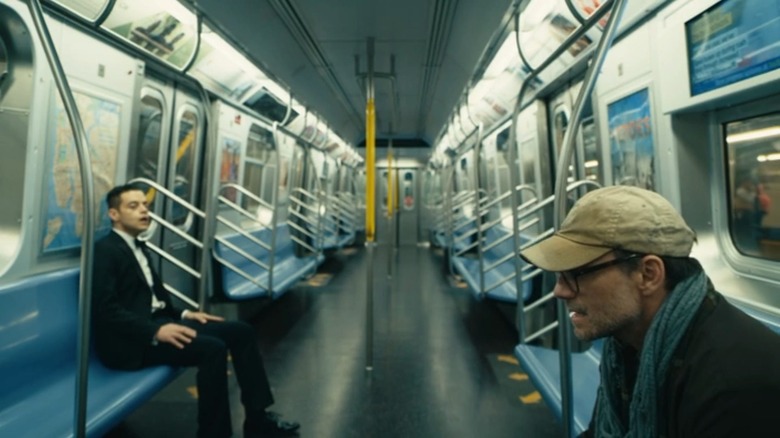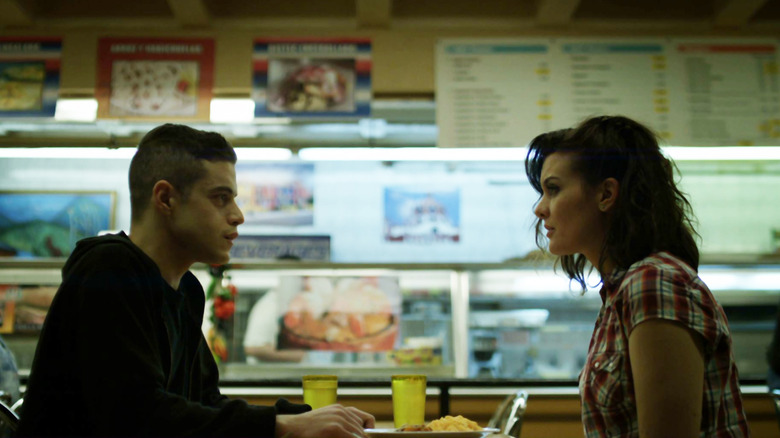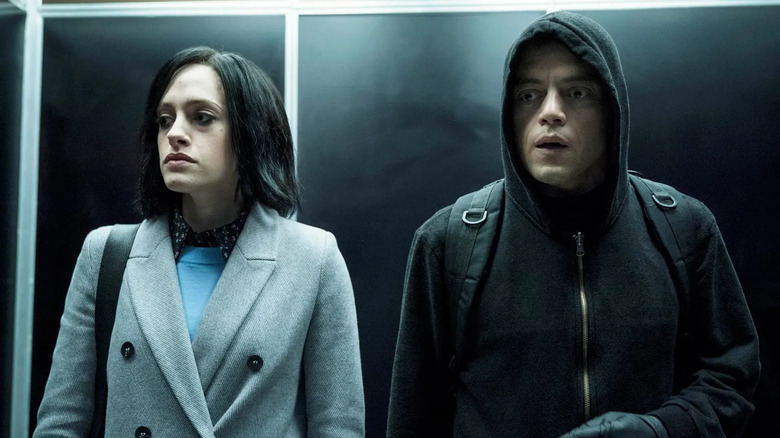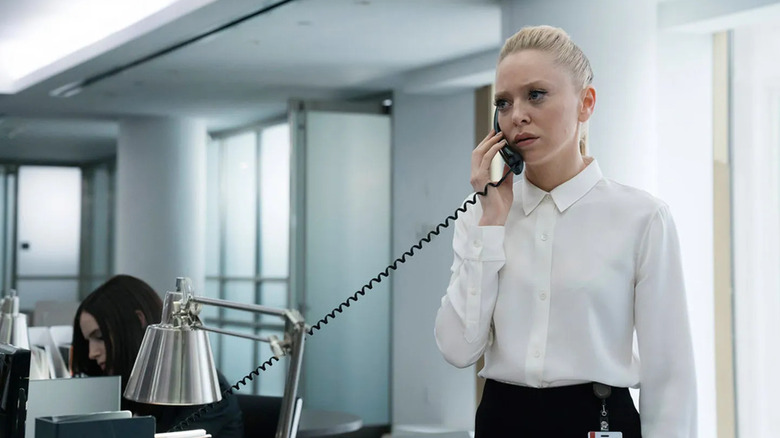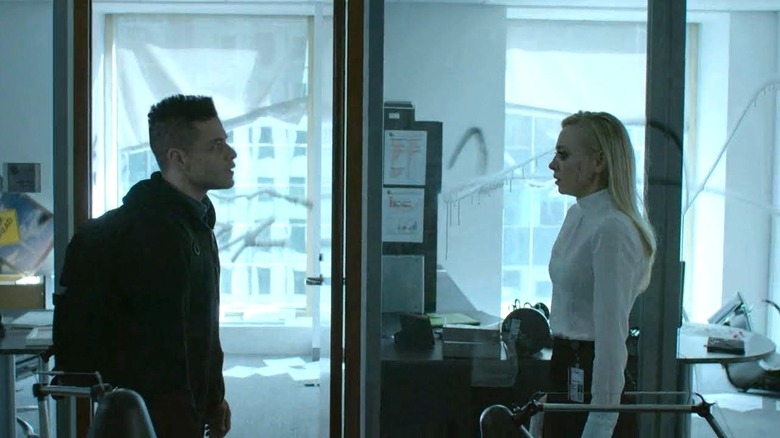Every Season Of Rami Malek's Mr. Robot, Ranked
In the broader culture, "Mr. Robot" is known as the show that started off great but quickly devolved into a meandering mess. You can see this with how the ratings plummeted sharply with the second season. By the time season 4 aired in 2019, the show was averaging a little more than a quarter of the viewership it was getting back in 2015. Seasons 3 and 4 may have been well-received by critics and the show's remaining fans, but that wasn't enough to convince viewers to return.
Among the fans who've stuck to the very end, season 2 is still known as "the bad one," the season they warn new viewers about ahead of time. The narrative is that this is the season you have to struggle through to get to the reward of seasons 3 and 4. But I for one think that's a flawed narrative. If I leave this Earth having accomplished only one thing, let it be that I've changed a few minds about the secret masterpiece that is season 2 of "Mr. Robot." It wasn't quite good enough make the #1 spot on this list, but it comes pretty damned close.
Please enjoy my ranking of every "Mr. Robot" season from worst to best. And if you have a problem with the order you can take it up with my alter-ego, who is responsible for any takes here you don't agree with. (Any takes you do agree with were written by me.)
Caution: spoilers below.
4. Season 1
I think part of why only season 1 garnered widespread audience love is because this is "Mr. Robot" at its most straightforward. It's a season about a mentally-ill genius hacker who's been recruited to take down the 1%. It's a show centered around one clear protagonist in a standard good vs evil struggle. Even the twist with Elliot's dual personality, while convoluted at times, is comfortingly familiar; audiences have seen all these beats before with David Fincher's "Fight Club," which showrunner Sam Esmail has been open about taking inspiration from.
The result is that, as stylish and exciting as season 1 is, it's the show at its most basic. If you've seen "Fight Club" you can tell almost exactly where everything's going. The show's worldview also comes across as a little too naive here, perhaps intentionally so; as we get to see the full consequences of Elliot/Mr. Robot's war on E-Corp in subsequent seasons, the show's social commentary grows more nuanced.
The biggest problem with season 1, which isn't really a problem but a necessary side effect of the show setting up its big twist, is that it holds all the non-Elliot characters at arm's length. Darlene (Carly Chaikin) is one of the show's best characters, but you wouldn't know it here. Because the show needs to build up to the reveal that she's Elliot's sister, Darlene can't even be shown interacting with Angela (Portia Doubleday) until episode eight.
I worry I've been too mean to season 1 in this entry, so to be clear: it's still amazing. It's the season that established the show's unique visual style, and it's the only season where Tyrell (Martin Wallström) gets the proper screentime he deserves. It's also the only season with the delightful Shayla (Frankie Shaw) around; it was sad to see her go, but man was the gut-punch of her death handled well.
3. Season 4
There's a lot to love about season 4: there's the thrilling no-dialogue heist episode halfway through, the game-changing therapy reveal two episodes later, the climactic downfall of Whiterose (BD Wong), and so on. I'm also fond of that "Twin Peaks"-esque finale with Elliot hanging out in some alternate reality. (Of course, "Mr. Robot" is more straightforward with its handling of this supposed parallel universe, but it hits a lot of the same emotional beats). Season 4 was a bold, satisfying conclusion to the series; if only all final seasons could be this strong.
If there's a problem here, it's that Tyrell and Angela are seriously shortchanged. It's often rumored that there was supposed to be five seasons but Sam Esmail condensed the final two into one; the anticlimactic deaths of Tyrell and Angela seem like a clear side effect of that supposed choice. While it's possible that neither Angela nor Tyrell were ever supposed to have happy endings, it's hard to imagine that their season 4 arcs (or lack thereof) were the plan the season 3 finale was setting up. It's just straight-up awkward to have Angela end season 3 the way she did, only to kill her off five minutes into season 4.
The rumors that Angela was killed off due to behind-the-scenes conflict with Portia Doubleday have never been proven, but it's easy to understand why they're so popular; Angela's death feels like something forced on the show by real-world circumstances. I ultimately think the show handled the fallout from Angela's death as well as it could've, but I would've preferred a version of the show where she got to stick around a little longer. She could've still been killed, but surely they could've let her get a few kicks in at Whiterose before she went?
My other issue with season 4 is that the world feels smaller than it did in seasons 2 and 3. There's a big monologue given by Phillip Price about how Whiterose is almost single-handedly responsible for everything that's ever happened in this world; the point was to establish her as the big scary villain, but it also brought the show's social commentary back to its season 1 levels of simplicity. Seasons 2 and 3 established that Whiterose was the result of capitalism run amok, whereas season 4 acts like capitalism run amok is the result of Whiterose. The former take was more interesting.
2. Season 2
Is season 2 a little slow to start off? Sure. Was the whole prison reveal a bit much? Probably. But I'd argue that season 2's decision to put Elliot on the sidelines for the first half is the smartest choice it ever made. It allowed Angela, Darlene, and newcomer Dom (Grace Gummer) to take center stage, and they're all amazing. Season 1 was the Elliot show, with Angela and Darlene forced into side-character roles; season 2 transitions the series into an ensemble piece, and it's far more stressful and unpredictable that way.
What I find most refreshing about season 2 is the way it embraces the hard part of a revolution. Season 1 follows all the general beats of "Fight Club," but "Fight Club" only ends with the buildings exploding; season 2 focuses on what happens after the smoke clears. Turns out there's nothing fun or romantic about a big society-altering revolution; it's brutal and deadly, with constant setbacks and unexpected consequences. Season 2 still takes the side of FSociety, but it has no illusions about the mental toll their actions are taking on them and the world around them. They struggle with regret and start questioning their ideals, as anyone would after ushering in the second Great Depression.
The best part of season 2 is Angela, who sacrifices her humanity (and her relationship with her own family) in her attempt to take down E-Corp from within. Portia Doubleday gives the performance of a lifetime as Angela works through some of the heaviest, most complicated material in the series. I don't think anyone on this show is ever quite as interesting as Angela is here, attempting the impossible Sisyphean task of navigating this corporate world with her sense of self in tact.
Season 1 keeps Angela on the sidelines and most of season 3 keeps her at arm's length (due to her unfortunate brainwashing by Whiterose); season 2 is the only section of "Mr. Robot" where Angela truly gets to shine. For that, it'll always hold a special place in my heart.
1. Season 3
For the critics at least, this is the season that proved "Mr. Robot" still had it. Season 3 is barely-controlled chaos the entire way through, filled with some of the most devastating and surprising moments in the series. "eps3.4_runtime-err0r.r00," the episode seemingly shot all in one take, is still one of the most ambitious (and most successful) episodes of TV ever made, only for the next two episodes to get even crazier and darker. That three-episode run is arguably the climax of the entire series, the period the first two-thirds of the show were building towards and what the final third is reacting to.
And although I for one love season 2, season 3 must still be commended for how effectively it builds off what season 2 setup. It retroactively improves season 2 by proving to viewers that the writers did indeed have a plan all along, that the slow pace of season 2 was a temporary, necessary choice. What's also nice is that season 3 is the only season that never lies to us; seasons 1, 2 and 4 all have a reveal that radically reshapes everything we'd seen before, but all the big reveals of season 3 are stuff that happens within the show's real world, not inside Elliot's head. It's a smart choice, because that prison reveal was really pushing it last season.
Maybe the best sign of how good the show had gotten by this point was in the season 3 finale, during a tense sequence where Darlene has a gun pointed to her head. In most shows you can usually tell when a character is going to die, but this scene it truly feels like it can go either way. When "Mr. Robot" threatens to kill a character, you believe it. (Providing of course that it's not Elliot). This makes the later seasons especially stressful, because by then we've come to love the non-Elliot characters so much.
I've always considered season 2 and 3 of "Mr. Robot" to be one giant season split in half, with season 3 being the big explosive payoff to season 2's slow and steady set-up. I still think season 2 is a thrilling watch in its own right, but even if you find it a slog you should still stick with it for season 3's sake. Good things come to those who wait, and there is no better reward for your patience than "Mr. Robot" season 3.
